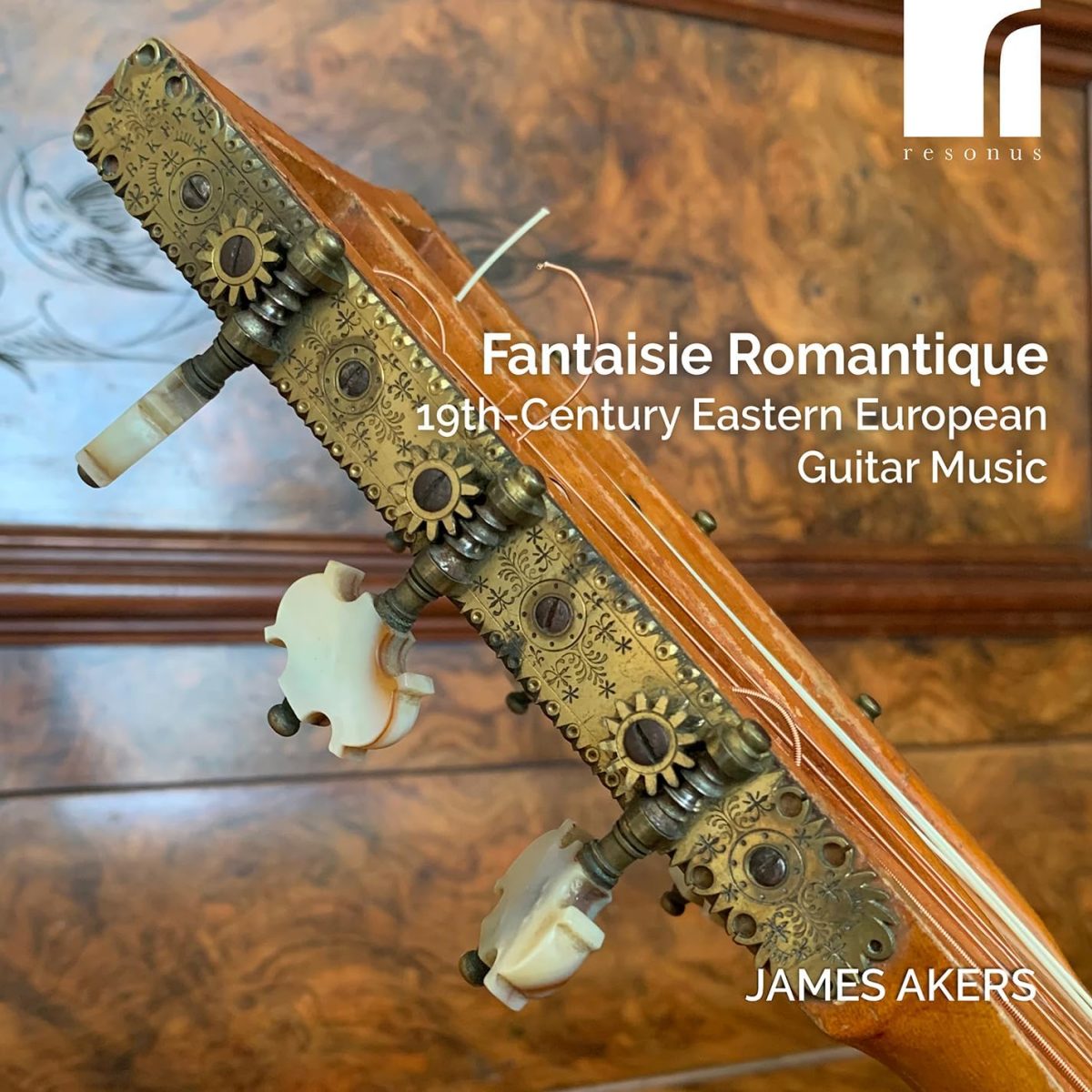19th-Century Eastern European Guitar Music
James Akers
63:07
resonus RES10334
With this charming CD, James Akers continues his exploration of guitar music from 19th-century Ukraine and its neighbours. He plays music by seven composers on three different guitars: by Pietro Pettoletti (c. 1795-c. 1870) on a six-string guitar; by Johann Dubez (1828-1891), Nicolai Petrovich Makaroff (1810-1890), and Johann Kaspar Mertz (1806-1856) on an eight-string guitar; and by Mikhail Polupayenko (1848-1902), Johann Decker-Schenk (1826-1899), and Nicolas Pavilstscheff (1802-1879) on a nine-string guitar. All three instruments have their first six strings tuned the same as a conventional Spanish or classical guitar from Western Europe (EAdgbe’), and although some of these composers also wrote for the seven-string Russian guitar with its distinctive open G tuning (DGBdgbd’), none of that repertory is included on the present CD. The instruments with two or three extra strings may at first sight look weird, because the extra strings are fixed equidistant from the other strings at the bridge, but splay out away from the sixth string to their own separate nut leaving quite a gap between the sixth and seventh strings. I guess that this enables the instruments to feel the same at the nut end, and allows the player space for his left-hand thumb to reach round the neck to stop notes on the sixth string.
The harmonic palette of these guitarist-composers is at times somewhat restricted – take away all the tonic, dominant and diminished seventh chords, and there is not always so very much left – but the simple melodies decorated with appoggiaturas and acciaccaturas, occasional chromatic touches, flourishes of arpeggios up and down the neck, and a tessitura widened by extra strings in the bass and extra frets at the treble end of things, combine to create an overall effect which is pleasing to the ear, and would have provided easy listening for salon audiences. No doubt the listeners would have felt at home if they recognised popular folk melodies or well-known tunes from operas, and would have been impressed by the virtuosity of flashy, extrovert variations. Each item is quite short – a total of 39 tracks lasting a mere 63 minutes.
From Oleg Timofeyev’s interesting and informative liner notes we learn that Mikhail Polupayenko was born in Kharkiv, studied medicine in Kharhiv and Kyiv, and gave guitar recitals throughout the Ukraine. His last performance was in Bakhmut in 1902. His Fantasia on Zaporozyhe Themes consists of five short contrasting movements, now slow, now fast, ending with an exciting Allegro vivo where repeated riffs get faster and faster. It brings to my mind Cossack dancers wearing furry hats, with baggy trousers tucked into their boots, kicking out as they crouch down, and calling out with triumph and joy. One thing is for certain: Polupayenko’s music is pleasantly brought to life with Akers’ interpretation and his subtle contrasts of tone colour.
Polupayenko’s Fantasia was dedicated to his friend, the Austrian-born guitarist Johann Decker-Schenk, who moved to Russia in 1861. There is much variety in his music too: Ukrainische Weise is enhanced by some delicate harmonics, and the third movement of his Fantaisie Romantique has a tremolo effect sounding like a Neapolitan mandoline.
Unlike the other composers represented here, Johann Dubez was Austrian. He was a versatile musician who played the violin, harp, mandoline and zither, as well as the guitar. His flamboyant Fantaisie sur des motifs hongrois pour la Guitare consists of 11 short items, including Tempo di Marcia, a setting of the well-known Rácóczi March. The music for the Fantaisie is available online for free download from the IMSLP website, where you can see evidence of his extravagant style, including an Allegretto with fast, arpeggios up and down the neck of the guitar followed by five sextuplets, a passage of descending quavers, rounded off with a super-fast rising scale in broken octaves, diatonic for the first octave and chromatic for the second.
Virtuosity is a constant feature of the music of Nikolai Makaroff, and his Fleurs du Nord, Op. 3, No. 1, also available on IMSLP, are no exception. He finds various ways of catching a casual ear’s attention, including a tricky passage in “Down on Mother Volga”, where the melody is played entirely in harmonics. James Akers makes it all sound so easy, but it most certainly is not.
Pietro Pettoletti was born in Norway, lived for a while in Germany, moved to Sweden when he was 25, and eventually settled in St Petersburg. In his liner notes Oleg Timofeyev explains that Pettoletti’s Fantaisie sur une Romance favorite de Paschkoff, Op. 31, consists of variations on the song, “He fell out of love with me”, by Alexander Guriliov (1803-1858), and that there are no apparent links to the eponymous Paschkoff.
Akers ends his CD with Nicolas Pavilstscheff’s Grande Fantaisie sur un motif de l’Opera “La fiancée” d’Auber, Op. 25 – a splendid showpiece deserving much applause.
Stewart McCoy
